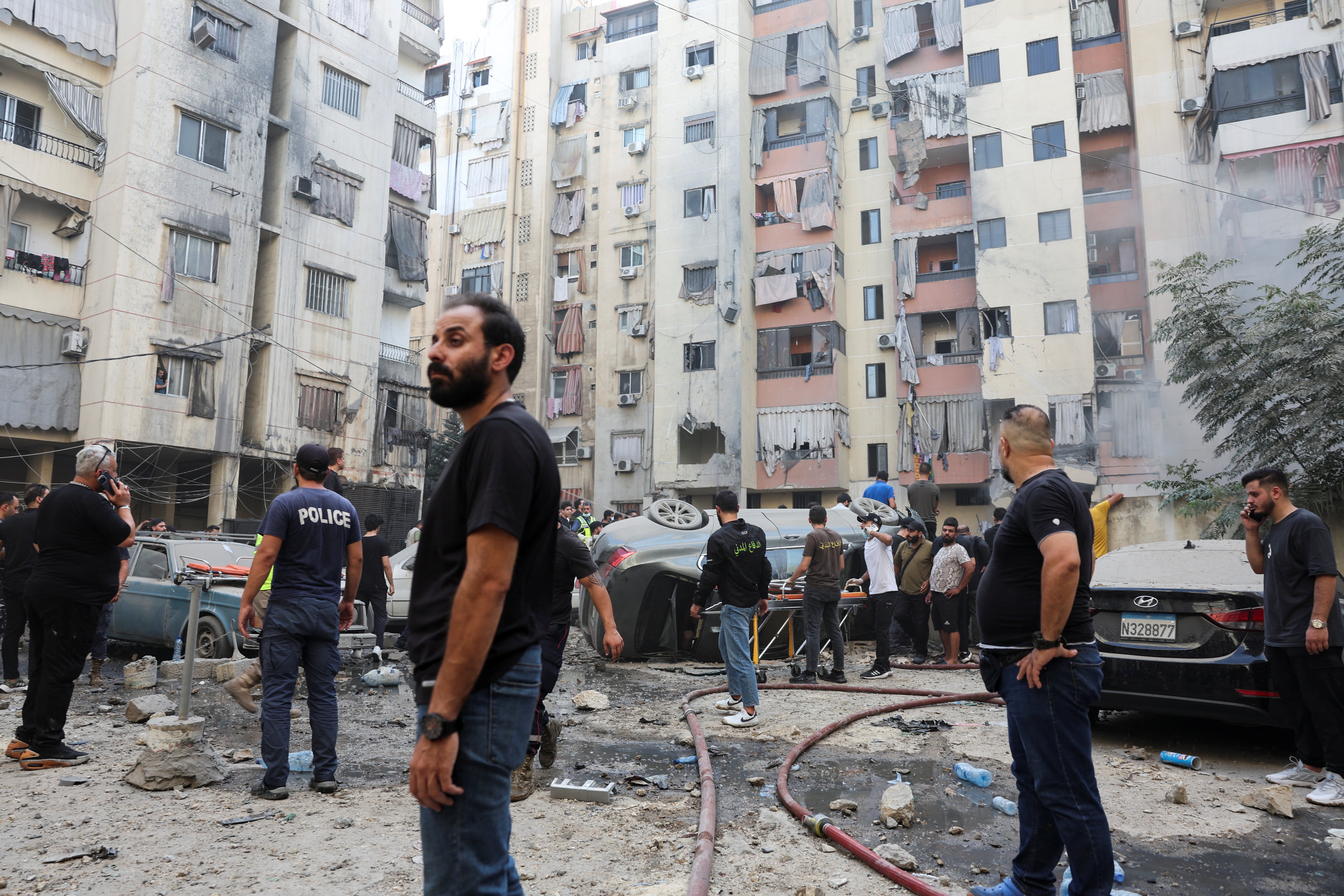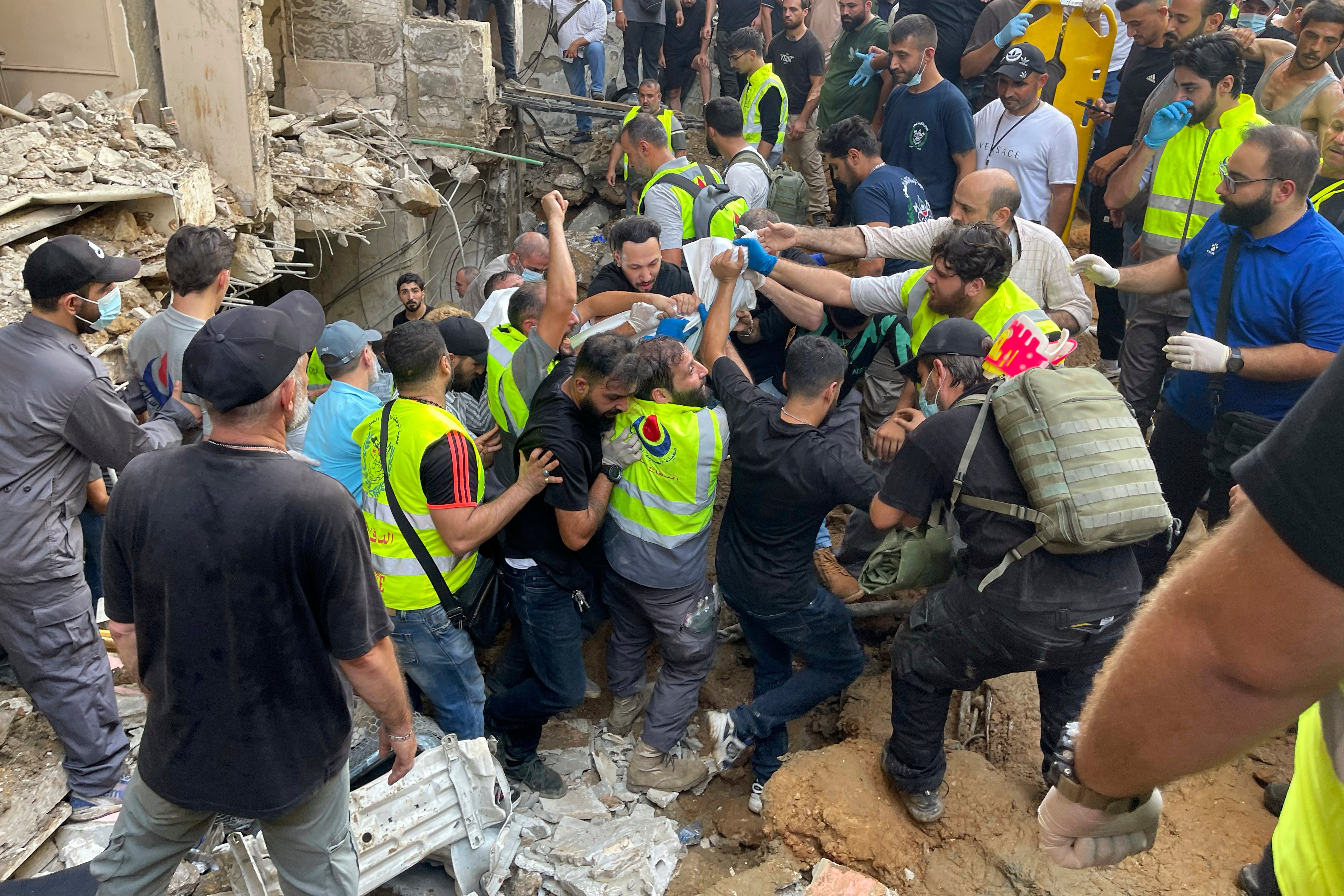Top Hezbollah commander killed in Beirut airstrike, Israeli military says – fuelling fear of all-out war
Ibrahim Aqil – wanted by US for alleged role in 1983 US embassy bombings – targeted in Lebanon’s capital

Your support helps us to tell the story
From reproductive rights to climate change to Big Tech, The Independent is on the ground when the story is developing. Whether it's investigating the financials of Elon Musk's pro-Trump PAC or producing our latest documentary, 'The A Word', which shines a light on the American women fighting for reproductive rights, we know how important it is to parse out the facts from the messaging.
At such a critical moment in US history, we need reporters on the ground. Your donation allows us to keep sending journalists to speak to both sides of the story.
The Independent is trusted by Americans across the entire political spectrum. And unlike many other quality news outlets, we choose not to lock Americans out of our reporting and analysis with paywalls. We believe quality journalism should be available to everyone, paid for by those who can afford it.
Your support makes all the difference.Israel says it has killed a top Hezbollah commander in a strike on Beirut, fuelling fears of an all-out war on the Israeli-Lebanon border.
Israeli military said that Ibrahim Aqi Aqil, who served on Hezbollah's top military body and was the acting commander of the group's elite Radwan force, was killed along with other senior commanders of the unit.
Lebanese health authorities said at least 12 people were killed and 66 more wounded in the attack which destroyed a number of residential apartments.
The strike inflicted another blow on Hezbollah after the group suffered an unprecedented attack earlier this week in which pagers and walkie-talkies used by its members exploded, killing at least 37 people and wounding more then 3,000. That attack was widely believed to have been carried out by Israel, which has neither confirmed nor denied its involvement.
A previous Israeli strike on Beirut in July killed senior Hezbollah commander Fuad Shukr. Another strike in January also targeted senior Hezbollah personnel.
Aqil is believed to have been involved in two Hezbollah bombings on the US embassy in Beirut and the US Marine Corps barracks which killed more than 300 people. Last year Washington put a $7m bounty on his head for any information leading to his location, arrest or conviction.
A thick cloud of smoke could be seen rising over the southern part of the city late on Friday as footage showed dozens of cars destroyed and debris carpeting the street outside several damaged high-rise buildings.
White House national security spokesperson John Kirby said he was not aware of any Israeli notification to the United States before the Beirut strike, adding that US citizens were strongly urged not to travel to Lebanon, or to leave if they are already there. The UK has made the same plea. The foreign secretary, David Lammy, chaired a meeting on Friday to discuss preparations to evacuate remaining Britons from Lebanon if required.

Mr Kirby said: "War is not inevitable up there... and we're going to continue to do everything we can to try to prevent it.”
The airstrike on Beirut came just hours after Hezbollah fired around 140 rockets into northern Israel. The group’s leader Hassan Nasrallah vowed on Thursday to retaliate against Israel for the mass bombing attack.
Israel’s military said the rockets came in three waves on Friday afternoon local time, targeting sites along the ravaged border with Lebanon.
Around 120 missiles were launched at areas of the occupied Golan Heights, as well as the nearby Safed and the Upper Galilee, some of which were intercepted, they said.
Fire crews were working to extinguish blazes caused by pieces of debris that fell to the ground in several areas, they said, without confirming if any missiles had hit their targets or caused casualties. Another 20 missiles were shot at the areas of Meron and Netua, roughly 40km (25 miles) west of the Golan Heights. Most of those fell in open areas, the military said, adding that no injuries were reported.
Hezbollah claimed its latest attacks had targeted several sites along the border with Katyusha rockets, including air defence bases as well as the headquarters of an Israeli armoured brigade they said they had struck for the first time.

The current Israeli conflict with Hezbollah, which was ignited a day after Hamas launched its attack on 7 October, killing around 1,000 people and leading to 251 more being taken hostage, and started a near-daily exchange of fire across the border. But tensions have spiked in recent weeks.
Hezbollah says it will not cease firing over the border until Israel stops its aerial and ground offensive in Gaza, intended to root out Hamas operatives allied with Hezbollah but which has also killed more than 41,000 Palestinians, according to the local health ministry, and displaced more than 90 per cent of the population.
US, Egyptian and Qatari efforts to broker a ceasefire between Israel and Hamas have stalled after recent negotiations.
On Tuesday and Wednesday, hospitals in Lebanon were flooded with the dead and injured after electronic pagers and then walkie-talkies used by Hezbollah simultaneously exploded.
Hezbollah and the local government – the two are separate authorities in Lebanon – blamed those attacks on Israel. Senior sources have pointed the figure at Mossad, the Israeli overseas spy agency, for an operation that will have taken months of planning.
A Lebanese source familiar with the walkie-talkies that blew up on Wednesday suggested that they were laced with a highly explosive compound known as PETN which had been tightly fitted into the battery pack, making it extremely difficult to detect.
A second security source also told Reuters that the pagers that exploded a day earlier had also been laced with explosives.
A US intelligence source later told ABC News that Israel had managed to “interdict” Hezbollah’s equipment supply chains and tamper with the pagers.
But Hezbollah said that the latest volley of rockets on Friday was in retaliation for Israeli strikes on villages and homes in southern Lebanon, not the two days of attacks.
On Thursday, Israel said its military had struck “hundreds of rocket launcher barrels” in southern Lebanon, saying that they “were ready to be used in the immediate future to fire toward Israeli territory”.
The army also ordered residents in parts of the Golan Heights and northern Israel to avoid public gatherings, minimise movements and stay close to shelters in anticipation of the rocket fire that eventually came Friday.
Join our commenting forum
Join thought-provoking conversations, follow other Independent readers and see their replies
Comments